- Home
- Madeleine Roux
House of Furies Page 11
House of Furies Read online
Page 11
His breath, however, was hot, and laced with pipe tobacco.
“Hello? Hello there! Are you listening?” He threw up his hands in frustration. “Pudding-headed yahoos, the lot of them,” he muttered, not nearly under his breath enough. Then he rounded on me again and I felt my breathless dread of a moment ago turn hastily into disgust. A towering shadow creature had just vanished before my eyes, and now this. Insults. I felt my fingers curling into hard, uncaring fists around the dusting rag and bucket handle.
“Do not berate the girl,” Mrs. Eames said, floating toward us and then pausing, looking down her nose at me. I stared back impertinently, wondering if these were the eyes of a scheming killer. She lifted one gloved hand and plucked at her lower lip in thought. “A servant never takes a slap without spitting in your wine,” she added. Her eyes, already chilly, seemed to look through me.
And when the veneer of warmth and beauty faded, how similar she looked to the shadow beasts, I thought.
“George Bremerton’s boy said something . . . Something about you being new here, child; is that correct?”
I nodded.
Mrs. Eames folded her hands together and smiled, but it was a withering look. A string of rosary beads hung around her wrist, tinkling softly. “Pray you last long enough to learn the true reward of obedience. ‘Before destruction the heart of man is haughty, and before honor is humility.’”
“Your tea,” I bit out through a clenched jaw, deliberately turning away from her to face her companion. “Of course, sir. Right away. Remind me of your room number again?”
“Third floor, room six, tea for Colonel Mayweather, for heaven’s sake! Shall I instruct you on how to set a kettle to boil, too? Does Dr. Merriman suffer this same neglect? How about Bremerton?”
Bow your head. Curtsy. Do not under any circumstances dump the bucket of foul water on his head and watch that bushy monstrosity on his face wilt like a wet dog.
I scuttled away from them, toward the stairs, and, as far as the odious Colonel Mayweather and Mrs. Eames knew, in the direction of the kitchens. They might get their tea eventually, but not from me. I had no intention of bringing that man anything. What was the point? As I had no desire to stay at Coldthistle, it now seemed ridiculous to continue doing any of the work expected of me. My time was better spent looking into this book Mr. Morningside had written and finding a way to break the barrier so I might hawk these rare books and leave. What could they do if I failed in my duties? Throw me out?
More’s the pity. I would have relished the opportunity to make their drinks bitter with spittle.
When I reached the landing, I paused, considering where I might read Mr. Morningside’s book in peace. It was burning a hole in my skirts, begging to be studied, if only to shed some small insight into his personality and motives, and how the book in the attic could be overthrown. But now I was certain the shadow monsters didn’t want me to have it—that made it more valuable, of course, but also more dangerous. Reading the book inside the house was out of the question.
I headed back outside for the second time that day, finding that the weather had remained chilly but not intolerable, with a heavy bank of clouds rolling in to sit like a dark thought over the manse. The rag and bucket I left in the small overhang near the door to the kitchens. Other tools and supplies were kept there on ladders leaned against the wall to form makeshift shelves. I poured out the bucket and squeezed the rag, leaving them both for some far more devoted worker to find.
Inside, I could hear Mrs. Haylam cooking supper, pots and pans clanging away. The yard between the door and the barns was empty, and I bundled my skirts and the book into my hands and picked my way quickly toward the low, dark building. The wind rose as I did, and the familiar heaviness of the atmosphere shifting before a storm made the hairs on the back of my neck prickle. Those clouds above me were no longer just a thought but a genuine threat.
The smell of hay and horses wafted toward me as I gained the barn. It was a sturdy, handsome building made of thick timbers. All of it had been painted a rich black-brown, and it looked newer and in better repair than Coldthistle itself. I peered inside one of the open doors, anxious for any sign of Chijioke or the others. But I was alone. Well, alone but for the five horses in their stalls. A few ears turned toward me with interest, but the beasts didn’t seem to mind the intrusion.
I had always loved the coziness of barns, and used more than one as shelter when I ran away from Pitney. This one, too, felt almost homey, and I raced between the horse stalls to a rope dangling from the ceiling near the far wall. An open archway there led to the coach storage and Chijioke’s workshop. I grabbed the rope and pulled, grunting from the effort of it, then scampered up the makeshift stairs that appeared from the ceiling.
The hayloft was exactly as I’d hoped—empty, warm, and quiet. I pulled up the stairs behind me and settled onto a mounded lump of hay. There were only two windows in the loft, one that looked toward the house, another with a view of the fields next door. I chose the one with more light to read by, watching more rain-bloated clouds roll in over the pasture.
Mr. Morningside’s book had not found gentle treatment in that library. Water-damaged and yellowed, the pages felt brittle enough to crumble in my fingers. Gently, I cracked the weathered cover, finding an inscription written in an elegant hand, one I assumed belonged to Morningside.
Spicer,
This had better make us even, you miserable bastard. I know I owe you for that cock-up in Hungary, but this is getting out of hand. Szilvássy wasn’t even my man, he was yours, but I admit mistakes were made on both sides. It should be in the past, as all things inevitably are. Even you cannot hold a grudge this long.
At any rate, read this or don’t, but don’t say I never did anything for you. Sparrow can find her own copy; she despises me anyway.
Yours in perpetuity (ha!),
Henry
I read the inscription three times. The second time because it was hard to imagine the Mr. Morningside I had met admitting he was wrong about anything. The third time because I at last noticed the little date dashed off under his signature.
December, 1799
Either the date was wrong, or Morningside was far older than my estimations. A six-year-old boy could not have written a complete book and made out an inscription in it. Even a seven-, eight-, or nine-year-old was silly to consider. By generous calculations, a person would need to be at least fifteen to manage a book of this length and apparent complexity, which would put him currently around six and twenty. That couldn’t be. He hardly looked a day older than Lee or myself!
But his backward feet couldn’t be, either. Nor could little girls who murder or books that lure and trap or walking, talking shadow creatures. None of it was possible, and yet . . .
And yet . . .
Reasonable, earthly thinking must be set aside, I decided. Mr. Morningside could be a youth, or an elder, or anything in between. Poppy had called him a grumpy old man. Either he had somehow located the Fountain of Youth, or there was more here that I did not yet understand. The book, naturally, might lend a few ideas. And so I began to read. The introduction spoke of world travels, of schooners and wagon rides, horseback adventures spanning months, dangerous climbs up previously unconquered mountains, and dozens of references to explorers and chroniclers I did not recognize.
It told me little. He had traveled far and wide, though I could not venture a guess at how, considering his unusual feet. That was not so surprising—he was a young (or not) man of surprising fortune and a collection of exotic birds. World explorer did not run counter to that particular persona.
Chapter 1: In Which I Meet a Child of the Dark Fae and Make an Impassioned Plea
Now we were getting somewhere.
Chapter Eighteen
In Which I Meet a Child of the Dark Fae
and Make an Impassioned Plea
My most recent travels in Ireland left me with one conclusion: the Fae do not choose their victims at rando
m, and the Dark Fae are even more particular.
While traveling to Derry, I made a brief stopover at the Crosskeys Inn, and met there a young woman, perhaps only fifteen years of age, begging outside in the cold rain. I invited her in to dine with me, to her great surprise, but by and by she joined me, eating what can only be described as a remarkable amount of chicken liver pie. Over this harrowing feast and several pints of good stout ale, I invited her to tell me how she came to be a beggar in these parts. She reacted with hesitation at first, and that is perhaps my own fault; all this while I had been studying her closely, for the woman—we may call her Edna—possessed all the markers one expected from a Dark Fae descendant.
The very black hair and similarly black eyes, the paleness, the thin stature and sunken cheeks . . . All of these features I had sketched before when encountering what the Irish merely dubbed “Changelings.”
“My mother, she had me young and without a man” was Edna’s explanation.
“You mean unwed,” I replied.
“If you like,” she said, visibly uncomfortable.
“You will have no judgment from me,” I told her.
Edna nodded, and continued, saying, “The family liked to tell it that mother was never the same after she came in from washing at the river one day. That’s the river Bann, I mean to say, and her cousins said she was gone for two whole days just to do a bit of rinsing. Two whole days! It couldn’t be true! But all present swore to it, and for a long while Mother thought they were just having her on. She started to believe a wee bit more when the babe—I—came along.”
And here she stopped, for she had become suddenly emotional. Some men in the inn looked at us with more than polite curiosity. More proof for my solidifying theory.
“She was taken,” I said to her, calm. “This is not the first I’ve heard of such a thing.”
Her eyes grew enormous and she nodded, reaching for my hand and squeezing it, in relief, I warrant, or gratitude. As with all descendants of the Dark Fae, I battled a disquieting feeling in my chest. Those unaccustomed to mythic and magicked creatures do not understand that they are experiencing the body’s natural ability to detect Unworldly or “Dark” elements. This is almost always chalked up to “instinct” or “gut feeling” that leads to instant repulsion, but one can learn to control this response.
I did not flinch away from her, and Edna noticed this.
“You’re different,” she told me. “You believe me.”
“Yes, and yes, but I must ask you to remove your hand, madam, as we are drawing a number of unsavory glances.”
Edna complied, but her excitement was not diminished. “Changeling whore,” she whispered, “that’s what they call me. That’s why I’ve no family, no man of my own. Folk ’round here just know it, can sense it. They know something is wrong with me, but that isn’t fair-like, is it? I didn’t do nothing to get this way, and my poor mother . . .”
“The grim reality we must all face is that the dark and different and strange among us face a kind of exile. Man desires comfort above all else. Comfort, security . . . You were born of an unworldly creature and a hapless mortal, and if an innocent washerwoman could be stolen away to the heart of the forest and made to be a Fae bride, then no one is really comfortable and no one is truly secure. Then that bump in the night could come for them or their sister or their son, too, and that is chaos. That is ruin. You are ruin and chaos to them, but you are lovely to my eye.”
“You’re brave or daft, then,” she said, quite rightly. “Chaos and ruin. Where does that leave me, then?”
“In the in-between, my dear, where all things magic go to wait.”
I put several coins down on the table to cover our meal, then handed Edna what money I could spare. She grasped my hand again, trying to pull me back down to my chair.
“Wait?” she asked. “Wait for what?”
I did not answer her then and still cannot. Long have I suspected that the growing number of so-called Changelings among us is a sign of acceleration. We are moving quickly toward a reformation of the world, I think; the widespread proliferation of Unworldly and magicked creatures does not so much hint at this but points and stamps its feet and shouts: What has been made in darkness to serve the dark will rise at last, at last!
It is the deep, trembling drum that beats faster, ushering in an age we humble explorers and historians can only imagine. Apocalypse, cry some, but I disagree. Some of my less compassionate colleagues use their studies as a means to an end, that end being eradication. This is foolhardy in the extreme. These creatures, these people, are not weeds to be pulled out and flung aside. They have been hunted and burned and driven out for millennia, and who are we to deny them their ascension?
Does Edna not deserve a home and family of her own? Must she beg until death at the doors of those who would shun and hate her and keep her forever scrabbling in the mud, all for the sake of their comfort?
Esteemed men and women of this most curious profession, I call on you in this first chapter and in all those that follow to hear this, the closest I will come to a thesis, to see these creatures—these Changelings and priests of shadow and Wailers and all else—not as curiosities to be studied but as people to be understood.
My mind rebelled, filled with churning, burning, horrible questions, and yet I slept. I had never begun to dream as quickly as I did that night in the barn, finding myself at once immersed in a vivid memory of my birth town.
Waterford was a place of wonder to me, of magic, of cracked, crumbling keeps and brightly painted houses lining a serpentine river. Beautiful houses filled with Waterford glint glass, homes like princesses would live in, homes that I would never have. Our house was just a shack on the edge of all this singularly Irish beauty. In my dream it was night, and I could see from our perch on a dusty berm the boats moving downriver.
I was tiny again, no more than five, dressed in the thin dress my mother had patched beyond recognition. It could have been a rag for scrubbing dishes with all the holes and tears and dodgy seams. In one hand I held my favorite dolly, a crude thing like an effigy, just sticks and straw wrapped in scraps of potato sack. In the other hand was a cast-off piece of wood from the butcher down the lane. Only it wasn’t a nasty old stick to me, it was a sword and I was fighting pirates.
And of course, Maggie, my imaginary friend, was my first mate. Maggie. Mary. They were the same even in the dream. Perhaps even more the same. Her hair was like mine, wild and dirty, bits of hay and grass stuck in the snarls. Our swords clashed. We giggled and chased each other around the outside of the house. Mother yelled at us from inside but we ignored her. We were living a life of freedom on the high seas. We were unstoppable.
When my sword slipped and smacked her wrist and she began to cry, I held her and apologized over and over again. I’m sorry, Mary, I’m sorry, I need you. You’re my best and only friend.
She stopped crying and giggled again, the mistake forgotten. This was when we first became friends; not in the dream, but when I was five. It was around then that Father stormed out of our lives, off to start another family. I probably had half brothers and sisters scattered all across Ireland. This was when they screamed at each other day and night. This was when I began hiding in the cupboards, listening to the fights, jamming my fingers in my ears until it hurt.
That little beasty isn’t mine!
She is yours too, Malachy Ditton, she has your devil in her! Your eyes!
No eyes of mine, witch! Eyes from Hell! Don’t come at me with that broom, you’re the one gone and fecked a demon!
Even when they knew I was in the cupboards crying and hearing it all, they wouldn’t stop. When he left, she said it was just the drink that made him say all those mean things. But I knew there was truth to it, felt it deep in the place where secrets go to fester. Eyes from Hell. My eyes had always been strange and black, not like other children’s. Sitting in the cupboard, I wished for a friend who didn’t care, for someone who wouldn’t beat me in
the schoolyard because of the way I looked and was.
Mary saved me. No, Maggie. I called her Maggie. It didn’t matter. I chased her around the house and I was happy for a while. She didn’t care that my eyes were black or that my mother was odd.
Around and around we went, shrieking with laughter, smacking each other on the shoulders with our sword-sticks. Then she ran away from town and I followed her, into the wood, to the parts of the cove where I was never supposed to go. I hated listening to my mother’s superstitious nagging. Her stories were dazzling but couldn’t be true. Fairies and devils and all sorts in the wood. It was just a bunch of bushes and grass and trees, nothing scarier in there than a rabbit ready to startle you.
I followed Mary into the wood, up a hill, running out of breath but loving every second of it. I’d be hided for this when mother saw how dirty my feet had gotten. It didn’t matter. I ran after her, giving chase, little legs working hard. We crested a shallow hill and stopped short, oohing and ahhing at the sweet fairy ring that had sprung up around a kind of natural well. I picked up a stone and tossed it into the water, laughing.
“What if a water spirit’s inside?” I asked.
Suddenly it was night. The dream didn’t feel fun anymore. Mary was there but she looked sad. She sat next to the fairy ring and shook her head.
“You shouldn’t throw stones. That could be someone’s house.”
That was silly. What could live in that water but a fish or frog? I tossed another stone in, but it did not plop. Someone had caught it. Someone angry. A gray-green figure slid out of the water, its face and shoulders covered in slime. It was naked, but all I could see were its huge silver eyes.
“Little greedy child,” it whispered, hoisting itself higher until it loomed above us. I heard myself scream. “You disturbed the water and now I shall take her back home. She’s mine again, little greedy child, and you are alone. You are alone. . . . Alone . . .”

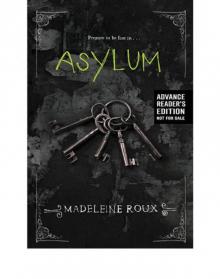 Asylum
Asylum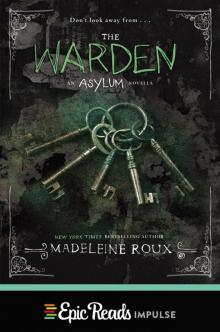 The Warden
The Warden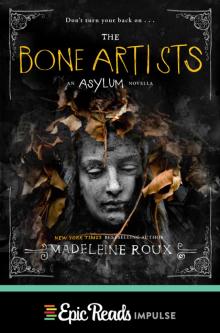 The Bone Artists
The Bone Artists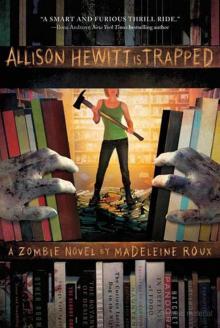 Allison Hewitt Is Trapped
Allison Hewitt Is Trapped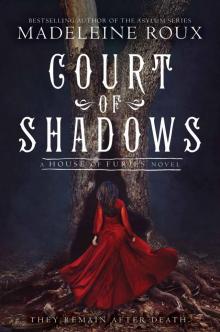 Court of Shadows
Court of Shadows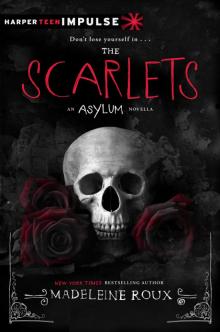 The Scarlets
The Scarlets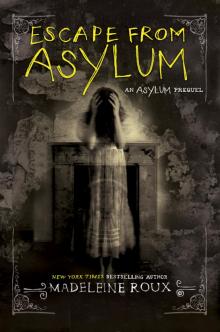 Escape From Asylum
Escape From Asylum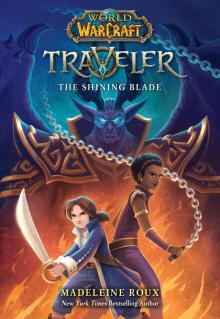 The Shining Blade
The Shining Blade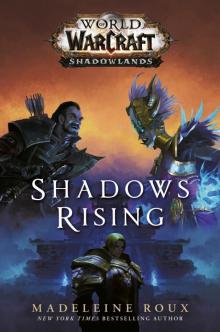 Shadows Rising (World of Warcraft: Shadowlands)
Shadows Rising (World of Warcraft: Shadowlands)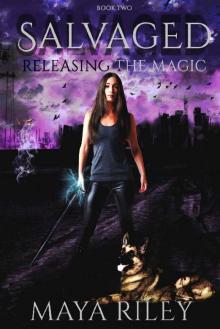 Salvaged
Salvaged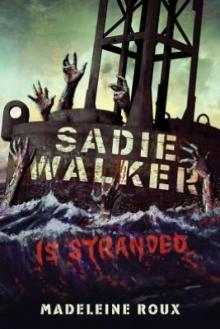 Sadie Walker Is Stranded
Sadie Walker Is Stranded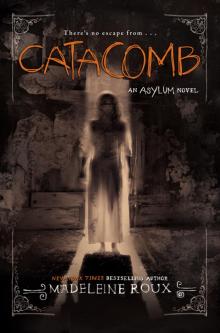 Catacomb
Catacomb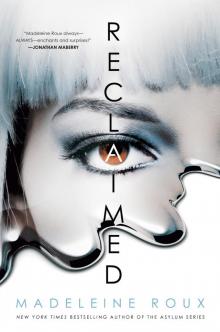 Reclaimed
Reclaimed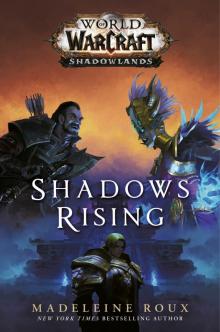 Shadows Rising (World of Warcraft
Shadows Rising (World of Warcraft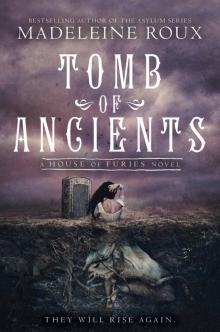 Tomb of Ancients
Tomb of Ancients